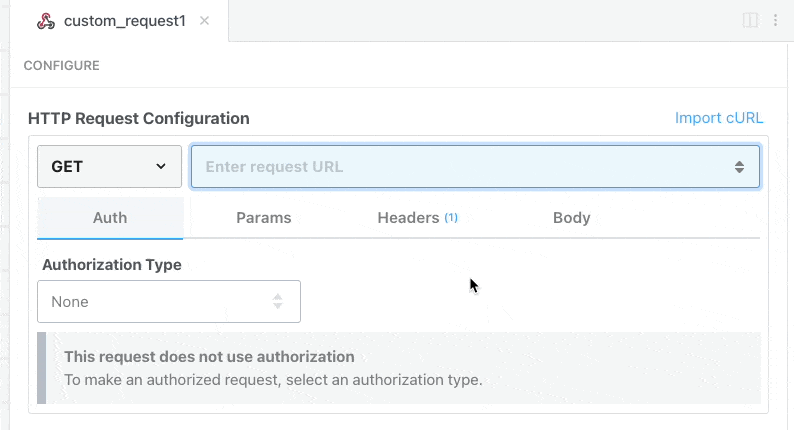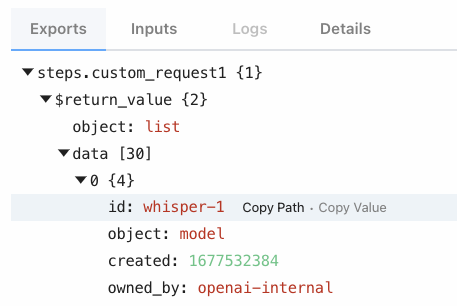import http from "../../http.app.mjs";
export default {
name: "Validate Webhook Auth",
version: "0.0.6",
annotations: {
destructiveHint: false,
openWorldHint: true,
readOnlyHint: false,
},
key: "http-validate-webhook-auth",
description: "Require authorization for incoming HTTP webhook requests. Make sure to configure the HTTP trigger to \"Return a custom response from your workflow\".",
type: "action",
props: {
http,
authInput: {
type: "string",
label: "Authorization Value to Authenticate",
description: "Select the location of the authorization value to check. For example, if you're looking for a Bearer token on the inbound webhook request, set this to `{{steps.trigger.event.body.headers.authorization}}`.",
default: "{{steps.trigger.event.headers.authorization}}",
},
customResponse: {
type: "boolean",
label: "Return Error to Webhook Caller",
description: "If `True`, returns a `401: Invalid credentials` error in the case of invalid authorization. **Make sure to configure the HTTP trigger to \"Return a custom response from your workflow\"**. If `False`, does not return a custom response in the case of invalid auth.",
default: true,
},
authType: {
type: "string",
label: "Authorization Type",
description: "Select the Authorization Type for the incoming webhook.",
reloadProps: true,
options: [
{
label: "Basic Auth",
value: "basic",
},
{
label: "Bearer Auth",
value: "bearer",
},
{
label: "Key-Based Auth",
value: "key",
},
],
},
},
async additionalProps() {
const props = {};
switch (this.authType) {
case "basic":
props.basicAuthUsername = {
type: "string",
label: "Username",
description: "Enter your username or reference an environment variable. For example, `{{process.env.username}}`.",
};
props.basicAuthPassword = {
type: "string",
label: "Password",
description: "Enter your password or reference an environment variable. For example, `{{process.env.password}}`.",
secret: true,
};
break;
case "bearer":
props.bearer = {
type: "string",
label: "Bearer Token",
description: "Enter your Bearer Token or reference an environment variable. For example, `{{process.env.token}}`. **Make sure to include any prepended values**, like `Bearer` for example.",
};
break;
case "key":
props.key = {
type: "string",
label: "API Key",
description: "Enter your API Key or reference an environment variable. For example, `{{process.env.api_key}}`.",
secret: true,
};
break;
default:
}
return props;
},
async run({ $ }) {
const authType = this.authType;
const authInput = this.authInput;
let basicString = "";
if (authType === "basic") {
const un = this.basicAuthUsername;
const pw = this.basicAuthPassword;
const str = `${un}:${pw}`;
const buff = Buffer.from(str, "utf-8");
basicString = `Basic ${buff.toString("base64")}`;
}
const authValue = this.bearer ?? this.key ?? basicString;
if (authInput !== authValue) {
if (this.customResponse) {
await $.respond({
status: 401,
headers: {},
body: "Invalid credentials",
});
}
if ($.flow) {
return $.flow.exit("Invalid credentials");
} else {
throw new Error("Invalid credentials");
}
}
$.export("$summary", "HTTP request successfully authenticated");
},
};
 Chase Roberts@chsrbrts@benedictevans If you haven’t used @pipedream yet, then you haven’t lived.
Chase Roberts@chsrbrts@benedictevans If you haven’t used @pipedream yet, then you haven’t lived. ✨Ellie Day✨@heyelliedayEvaluation update: @pipedream has quite literally been a dream to work with! I’m excited to leverage this tool for all the various workflows I need to write. I’m currently at 11k invocations a day from the initial workflows I’ve written in the past couple weeks.
✨Ellie Day✨@heyelliedayEvaluation update: @pipedream has quite literally been a dream to work with! I’m excited to leverage this tool for all the various workflows I need to write. I’m currently at 11k invocations a day from the initial workflows I’ve written in the past couple weeks. Michael Braedley@MBraedleyUpdate: I got it working properly, and it's working so well that I'm dropping IFTTT. @pipedream can do everything that IFTTT basic can, and most (if not all things) IFTTT pro can for free or at a reasonable price if you need it. I am recommending it for basically any power user.
Michael Braedley@MBraedleyUpdate: I got it working properly, and it's working so well that I'm dropping IFTTT. @pipedream can do everything that IFTTT basic can, and most (if not all things) IFTTT pro can for free or at a reasonable price if you need it. I am recommending it for basically any power user. Thomas Cutting@mrthomascuttingWant quick+dirty integrations for a serverless workflow - @pipedream is my new go-to 😃
Thomas Cutting@mrthomascuttingWant quick+dirty integrations for a serverless workflow - @pipedream is my new go-to 😃 Matthew Roberts@mattdotrobertsday 013 - finally hit node js. This is the secret sauce of taking #nocode projects that one step further. Pumped about getting deeper into @pipedream now
Matthew Roberts@mattdotrobertsday 013 - finally hit node js. This is the secret sauce of taking #nocode projects that one step further. Pumped about getting deeper into @pipedream now Kenneth Auchenberg 💭@auchenbergYahoo Pipes is back! Kinda 😍 @pipedream
Kenneth Auchenberg 💭@auchenbergYahoo Pipes is back! Kinda 😍 @pipedream Raymond Camden 🥑@raymondcamdenAwesome video by the @pipedream folks showing real time twitter sentiment analysis integrated with Google Sheets. This is where Pipedream *really* shines, connecting systems together in easy workflows.
Raymond Camden 🥑@raymondcamdenAwesome video by the @pipedream folks showing real time twitter sentiment analysis integrated with Google Sheets. This is where Pipedream *really* shines, connecting systems together in easy workflows. Nacho Caballero@nachocaballeroI couldn't recommend @pipedream more. It's an amazing service to integrate different APIs. Much more powerful than Zapier and more user-friendly than AWS Lambda. I'm very proud to wear this t-shirt #NoCode
Nacho Caballero@nachocaballeroI couldn't recommend @pipedream more. It's an amazing service to integrate different APIs. Much more powerful than Zapier and more user-friendly than AWS Lambda. I'm very proud to wear this t-shirt #NoCode Jason Snow@jyksnwDeveloped a working prototype environmental sensor IoT solution with @particle Photon, @pipedream, and @MongoDB with full graphing and alerting in less than a day! All amazing technology, will def. be exploring these more.
Jason Snow@jyksnwDeveloped a working prototype environmental sensor IoT solution with @particle Photon, @pipedream, and @MongoDB with full graphing and alerting in less than a day! All amazing technology, will def. be exploring these more. Steven Terrana@steven_terrana@burgwyn you've inspired me to finally set up my own blog. I'll make sure my first blog post explains the tech behind the setup. think @obsdmd + @GatsbyJS + @pipedream.
Steven Terrana@steven_terrana@burgwyn you've inspired me to finally set up my own blog. I'll make sure my first blog post explains the tech behind the setup. think @obsdmd + @GatsbyJS + @pipedream. 🚄 James Augeri, PhD@DotDotJamesWant to low-code your back end, need more horsepower than @Bubble / @KnackHQ, or just miss Yahoo! Pipes? Check out @PipeDream
🚄 James Augeri, PhD@DotDotJamesWant to low-code your back end, need more horsepower than @Bubble / @KnackHQ, or just miss Yahoo! Pipes? Check out @PipeDream Sébastien Chopin@AtinuxGitHub issues should be like @linear_app for maintainers. Looking forward more integrations with GH actions or tools like @pipedream 👀
Sébastien Chopin@AtinuxGitHub issues should be like @linear_app for maintainers. Looking forward more integrations with GH actions or tools like @pipedream 👀 Raul@raul_predescuIf you're a dev and not using @pipedream, you're missing out. Been using it for months, daily. FREE for devs. Plenty of integrations and good limits. Absolutely love it.
Raul@raul_predescuIf you're a dev and not using @pipedream, you're missing out. Been using it for months, daily. FREE for devs. Plenty of integrations and good limits. Absolutely love it. Bruno Skvorc@bitfallsSo @pipedream is pretty amazing. In 3 minutes I just made a flow which adds @rickastley's Never Gonna Give You Up to my @spotify playlist whenever a new pull request arrives in an old repo of mine.
Bruno Skvorc@bitfallsSo @pipedream is pretty amazing. In 3 minutes I just made a flow which adds @rickastley's Never Gonna Give You Up to my @spotify playlist whenever a new pull request arrives in an old repo of mine. Zach Lanich@ZachLanichUm, wow 🤯 @pipedream
Zach Lanich@ZachLanichUm, wow 🤯 @pipedream Steven Bell@bellontechI just used @pipedream to build a Shopify App. Wow, they make small backed tasks easy.
Steven Bell@bellontechI just used @pipedream to build a Shopify App. Wow, they make small backed tasks easy. Jay Hack 🎩🇺🇸@_jayhack_Very impressed with this bad boi - it reminds me of a @PalantirTech internal tool, but geared towards integrations instead of data analysis and far more customizable. Great expectations here 🚀🤩
Jay Hack 🎩🇺🇸@_jayhack_Very impressed with this bad boi - it reminds me of a @PalantirTech internal tool, but geared towards integrations instead of data analysis and far more customizable. Great expectations here 🚀🤩 Tree Sturgeon 🔥🚴♂️🌳@philsturgeonFor context this is day 2 of a really challenging and stupid migration from Notion to @airtable with disparate/missing data. It's going better than expected and thanks to @pipedream I don't have to bother the iOS dev to add W3W.
Tree Sturgeon 🔥🚴♂️🌳@philsturgeonFor context this is day 2 of a really challenging and stupid migration from Notion to @airtable with disparate/missing data. It's going better than expected and thanks to @pipedream I don't have to bother the iOS dev to add W3W.




